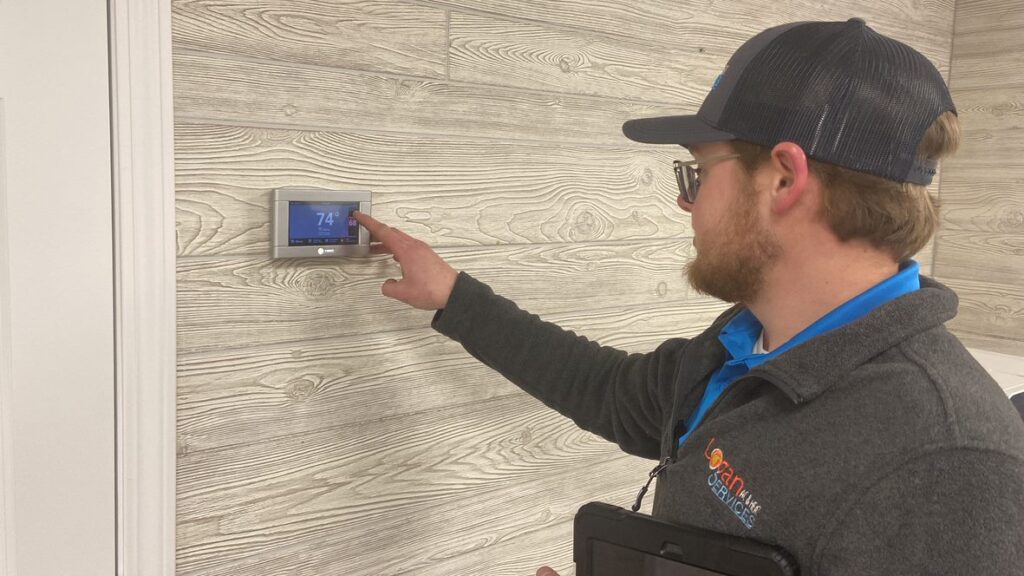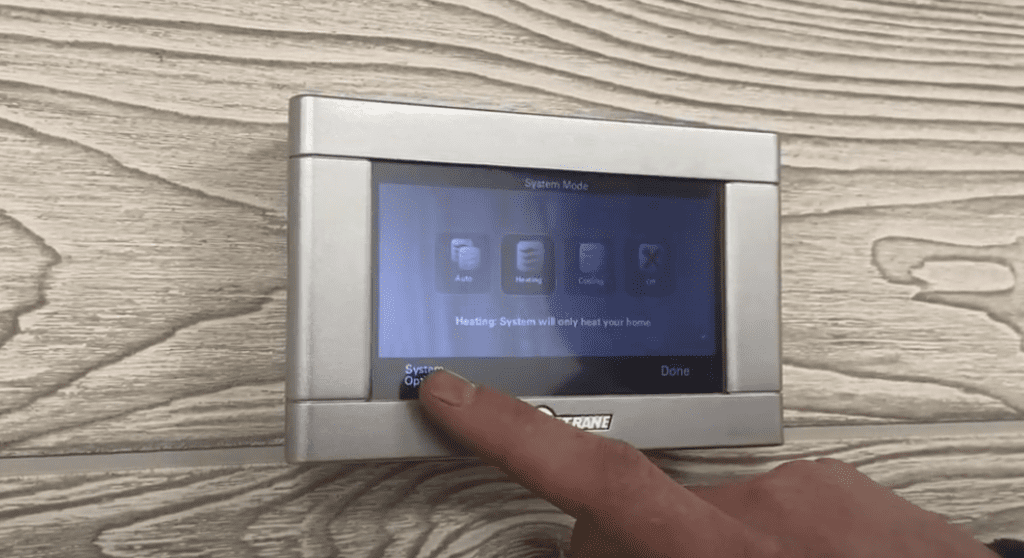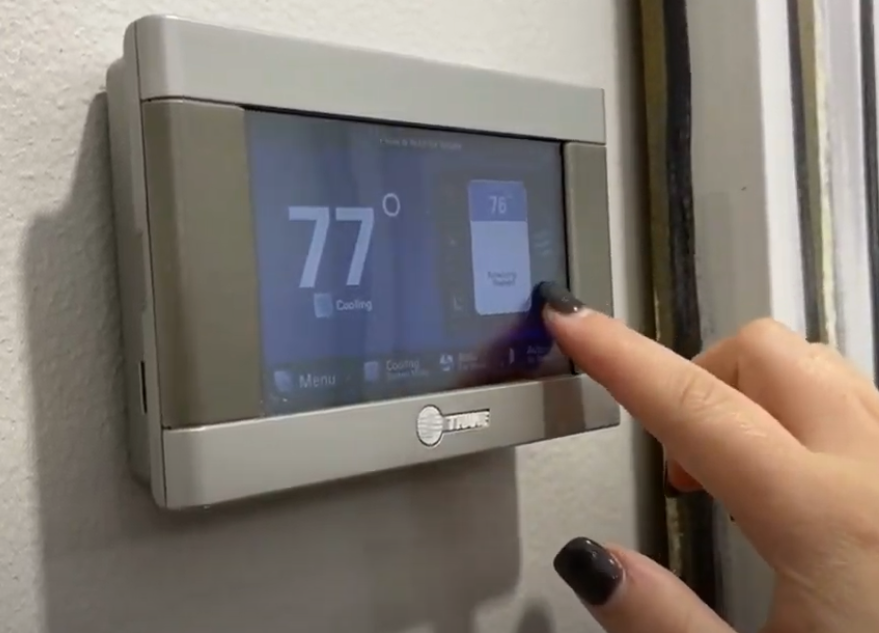Understanding the ideal temperature you should set your air conditioner to can help you feel comfortable in your home and even save you money on energy bills depending on what you set it to. This guide will take you through the basics of your air conditioner system, ideal temperature settings, maintenance tips, and how partnering with a trusted local HVAC service, like Logan Services A/C, Heat & Plumbing, can keep your home comfortable all year round.

Choosing the Right AC Temperature Settings
Understanding and optimizing your air conditioner temperature settings can positively impact both your comfort and your energy bills. Many factors, including your local climate, the design of your home, and your personal comfort level, can influence what these settings should be.
Crafting your perfect AC setting is a balancing act between maintaining a pleasant indoor atmosphere and keeping energy costs in check. With Logan Services A/C, Heat & Plumbing on your side, you can get tailored advice to suit your specific circumstances without compromising on your comfort level or energy-efficiency goals.
Factors to Consider
Selecting your ideal air conditioning temperature settings involves careful consideration of various factors. Leaving these factors out of your calculations or misjudging their relative importance can lead to uncontrollable energy costs and a less-than-optimal indoor environment. Here are elements you should consider:
- The Outdoor Temperature: The more intense the outdoor heat, the harder your air conditioner system has to work to maintain a cooler indoor temperature, leading to increased energy usage.
- Your Home’s Insulation: Well-insulated houses keep cool air in and hot air out, permitting the AC unit to work less and use less energy.
- The number of people in the house: More people can contribute to higher indoor temperatures and increased humidity levels, warranting lower AC temperature settings.
- Your Personal Comfort Levels: What feels comfortable to you is a crucial determinant. However, it’s wise to find your comfort spot within the energy-efficiency temperature range recommended by Energy Star.
Ideal AC Temperature Settings
Although personal preferences are a strong influencer, the Environmental Protection Agency’s Energy Star program suggests 78 degrees Fahrenheit as the ideal temperature for cooling when you’re at home and awake. When you’re away from home, it advises setting your thermostat up to 85 degrees Fahrenheit for optimal energy savings.
When you’re sleeping, the recommended, ideal temperature is different. The ideal sleeping temperature is between 60 and 65 degrees Fahrenheit. This allows for a more comfortable sleep, which can improve your overall mood.
Please note that these are generalized figures and might not apply to all situations and comfort levels. The recommended summer AC temperature can vary and be very different than the recommended spring or fall AC temperature. Remember, the goal is to find the highest temperature setting that still leaves you feeling comfortable during the summer months and the cooler setting that still feels comfortable during the winter.
Achieving these temperature-settings milestones helps to reduce your AC’s work level, cutting down your energy usage and subsequently trimming your utility bills.
Adjusting Settings for Efficiency and Comfort
Moving towards energy efficiency does not mean you have to compromise on comfort. If your current settings fall far from the recommended energy-star points, you can gradually adjust to them. For instance, you could start by setting your thermostat up one degree each week until you reach your intended target. This way, your body gradually gets accustomed to the new temperatures, minimizing any potential discomfort.
Investing in smart thermostats can also aid in efficient and convenient adjustments. These devices allow you to program your temperature settings based on your regular schedule. That way, you can effortlessly set your air conditioner to work less when you’re not at home, which saves energy and, in turn, money on utility bills. They even offer the ability to make adjustments remotely for those unexpected schedule changes.
It’s also worth considering the use of a ceiling fan or tower fan in conjunction with your air conditioner. Fans help distribute cool air around the room more evenly, which could make a higher thermostat setting feel just as comfortable as a lower one. This distribution results in less work for the air conditioner, enhancing energy efficiency while you still feel comfortable inside.
The journey to efficient and comfortable AC temperature settings may require some trial and error, but with patience and a little help from professionals like Logan Services A/C, Heat & Plumbing, you can achieve a delicate balance between your comfort and energy conservation goals, boosting your home’s overall air conditioning efficiency, and save you money on energy bills.

Maintaining Your AC for Optimal Performance
One of the critical aspects of ensuring your AC unit’s optimal performance is relentless diligence in its maintenance. A well-maintained air conditioner not only provides consistent quality performance but also considerably extends the unit’s life span while reducing energy costs.
The Importance of Regular Air Conditioner Maintenance
Just like a well-oiled machine, your air conditioning unit needs regular checking and cleaning to keep it working at its best. An air conditioning system must be consistently free of dust and debris for it to perform at the highest level. Regular maintenance also helps to identify any potential problems early, thereby saving you from unexpected breakdowns and expensive repairs.
Additionally, regular maintenance can lead to significant energy savings. A cleaned and adequately maintained AC system works more efficiently, resulting in less energy usage and cheaper utility bills. This not only helps you save money, but it also contributes to reducing the environmental impact.
Moreover, as temperatures rise during the summer months, a well-maintained AC unit will keep your home at an ideal temperature without having to work harder, which is a common cause of breakdowns in poorly maintained units. This practice will ensure you and your family feel comfortable throughout the year.
AC Maintenance Tips
While a checkup by a professional HVAC technician is highly recommended, there are also some simple steps you can take to maintain your AC unit:
- Regularly Clean or Replace the Filters: This simple step can have a significant impact on the efficiency of your air conditioning unit. Dirty filters restrict airflow, causing your system to work harder, which consumes more energy and can lead to potential damage.
- Keep the AC Coils Clean: Over time, the evaporator and condenser coils collect dirt that reduces airflow and insulates the coil, reducing its ability to absorb heat. Check the coils annually and clean them as necessary.
- Remove Debris From the Unit: Outdoor AC units are prone to accumulating leaves, dirt, and other debris that can obstruct airflow. Regular cleaning of the area around the unit will prevent blockages.
- Check the Fan Belt: A worn-out fan belt can cause efficiency issues in your AC unit. Regular check-ups and replacing the belt as needed can prevent this common problem.
However, if you notice major issues, such as strange noises, frequent breakdowns, or significantly reduced performance, it may be time to call in a professional to diagnose and fix the problem.
When to Call a Professional
While homeowners can handle basic maintenance tasks, there are instances when you need to call in a professional. Complex problems such as a malfunctioning thermostat, issues with the electrical components, or a coolant leak are best left to professionals. Trying to fix these issues yourself can lead to further damage or possible injury.
Regular professional check-ups and preventive maintenance, especially before the onset of the summer, can ensure that your AC unit is ready to handle high temperatures efficiently. The last thing you want is your AC not functioning properly in the summer. When it’s not, you might not be able to keep it at the optimal summer AC temperature. An HVAC professional can thoroughly inspect and clean the system, as well as catch potential problems early, preventing costly repairs and downtime.
Choosing a reliable and efficient team to care for your HVAC needs is vital. For homeowners in Dayton, Cincinnati, Columbus, and surrounding areas, look no further than Logan Services A/C, Heat & Plumbing.

Partnering with Logan Services A/C, Heat & Plumbing for Your HVAC Needs
When it comes to your home’s comfort and energy efficiency, the right service partner is crucial. Logan Services A/C, Heat & Plumbing, Ohio’s trusted HVAC solutions provider, has been working tirelessly since 1969 to ensure the comfort of households throughout the region. We pride ourselves on providing top-notch services by being transparent and flexible and building relationships within the community.
For decades, homeowners have associated Logan’s name with an unwavering commitment to quality, reliability, and customer satisfaction. With a firm grounding in these values and a lengthy history of service, Logan Services A/C, Heat & Plumbing can undoubtedly cater effectively to your air conditioning needs. We provide a range of services for your AC unit like:
- Air conditioning installation
- Air conditioning repair
- Air conditioning maintenance
Our experienced and professional technicians are equipped to handle the above services with various HVAC systems like commercial split systems, central air units, and more.
For all your HVAC needs, contact Logan Services A/C, Heat & Plumbing today.
Frequently Asked Questions
Is 72 a good temperature for AC?
72 degrees can be a good temperature for AC, depending on your preferences. It is within the recommended range to keep your home cool and everyone inside comfortable.
Is 75 too cold for AC?
Whether a temperature is too cold or not will depend on personal preferences, but 75 degrees is generally comfortable for most people in a home or building.
What is the best mode for your AC in the summer?
Dry mode is the best for the summer when you live in a humid environment, and eco-saving mode is ideal for saving you money on cooling costs without compromising comfort.





















